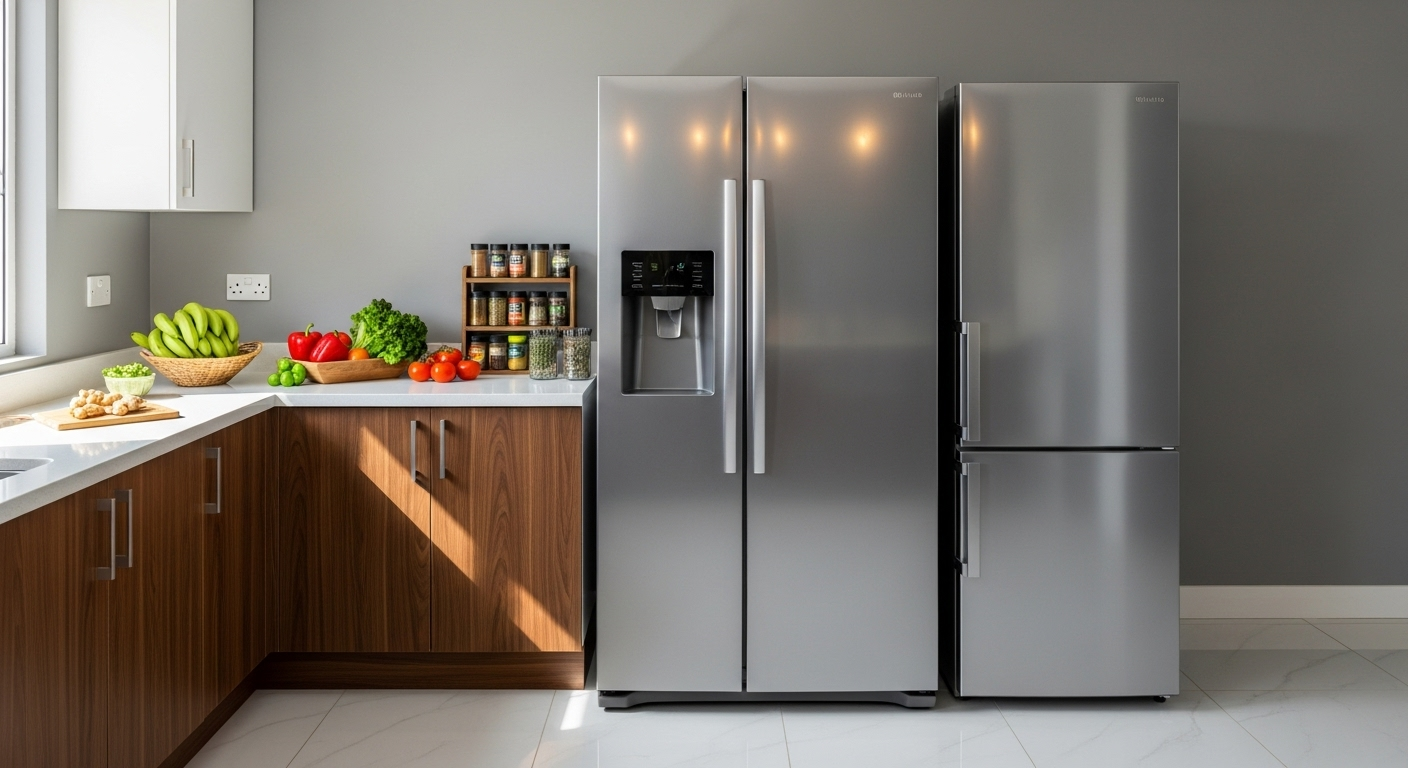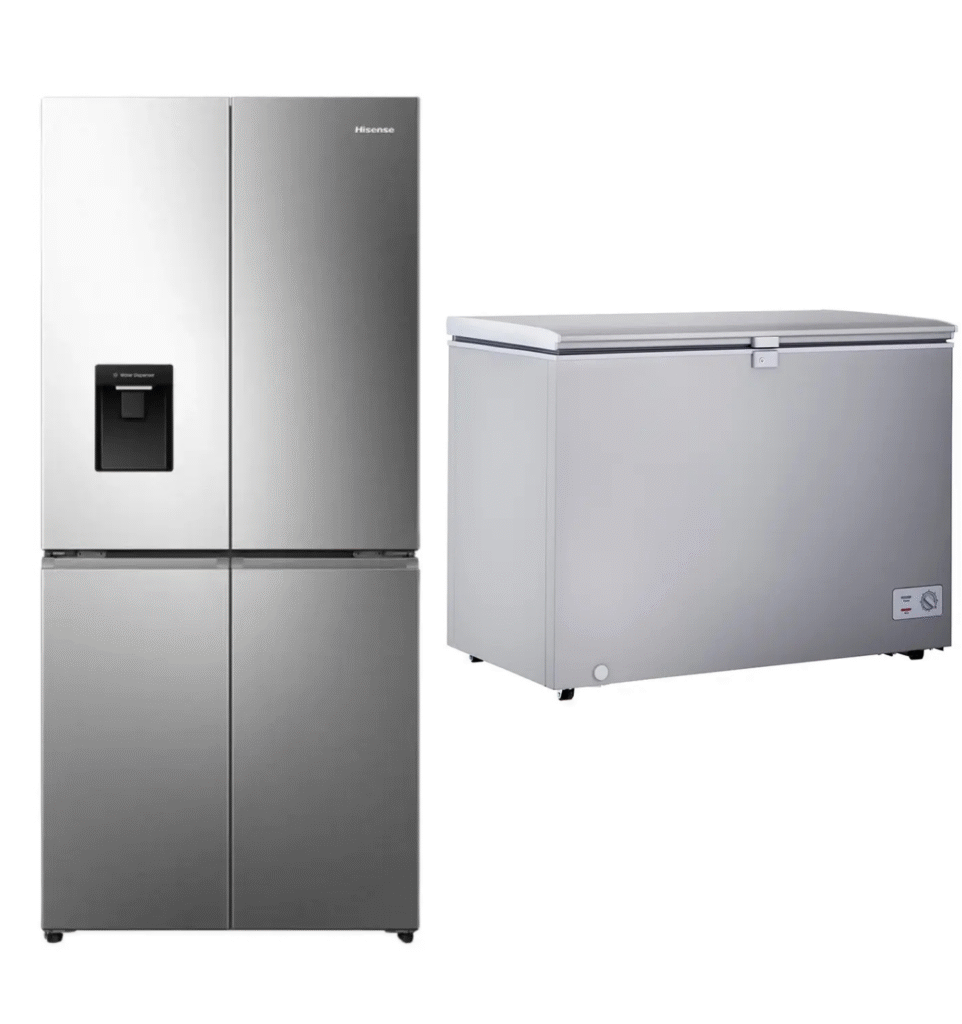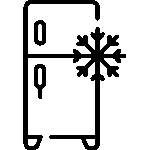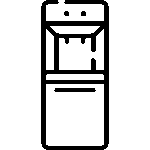The Ultimate Guide to Buying a Refrigerator/fridge in Nigeria (2025): Expert Tips for Smart Shoppers

Table of Contents
Introduction
Picture this: You’ve just bought a beautiful new refrigerator, only to discover it consumes more electricity than your entire house combined. Or worse, it breaks down after three months because it couldn’t handle Nigeria’s power fluctuations. Sound familiar?
If you’re reading this, you’re probably tired of dealing with unreliable refrigerators or ready to upgrade from that old fridge that sounds like a generator when it’s running. You want a refrigerator that will serve your family faithfully for years, not months.
Here’s the reality: buying the wrong refrigerator in Nigeria isn’t just expensive – it’s heartbreaking. Nothing hurts more than watching your food spoil because your fridge gave up during a heatwave, or receiving an electricity bill that makes you question if you accidentally powered the entire street.
But today, that changes. In this detailed guide, we’ll cover everything you need to know to select the perfect refrigerator for your family’s needs, tailored to withstand Nigeria’s climate and minimize your electricity costs.
By the time you finish reading, you’ll have the confidence to walk into any appliance store and make a decision you’ll be proud of for years to come.
Let’s be honest, buying a refrigerator in Nigeria is a serious mission. It’s not just an appliance; it’s the guardian of your food, the keeper of your drinks, and a lifesaver in our hot climate. But with the constant threat of “NEPA” doing what it does best, the high cost of running a generator, and a market full of fakes, choosing the right one feels like a high-stakes decision.
You’ve seen them all—from the massive “double-door” fridges in showrooms to the compact models advertised online. Salespeople will throw confusing terms at you like “inverter technology” and “low voltage start.” But what do you need?
I’m here to cut through the jargon. Forget the guesswork. This is the only guide you will ever need to buy a fridge that will serve you faithfully in your Nigerian home.
Size and Capacity
First things first, don’t just buy a big fridge because it looks impressive. You’ll waste energy and space. Let’s translate those confusing “litre” capacities into real-life Nigerian family sizes:

Capacity Guide by Household Size
For a Bachelor, Student, or a Couple (1-2 people): A 100 to 250-litre fridge is your sweet spot. This type of refrigerator is typically a compact, top-freezer model designed for efficiency, handling everyday essentials while keeping energy consumption in check.
For a Small Family (3-4 people): Look for something in the 250 to 400-litre range. This usually comes with enough space for weekly groceries, drinks, and leftovers.
For a Larger Family (5+ people): You should be considering 400 litres and above. Here, you’re looking at larger top-freezer models or the stylish Side-by-Side refrigerators, featuring double doors that provide ample storage and easy access to both fresh and frozen food compartments.
For businesses and stores, you can go for showcase fridges, which normally come in big sizes.
Pro Tip: Measure your kitchen space before heading to the store to ensure your new fridge fits perfectly, avoiding the hassle of returns or awkward installations. Measure doorways, hallways, and the designated spot to guarantee a smooth delivery and setup.
Power Efficiency
Understanding Inverter Compressor Technology
For Nigerians, energy efficiency is crucial when buying a fridge. An inverter compressor is a must-have feature, offering 30-50% less electricity consumption, quieter operation, and compatibility with generators or solar systems. When shopping, prioritize the “Inverter” label and check the energy efficiency rating, where more stars indicate better efficiency. This feature is a game-changer for minimizing electricity costs and ensuring smooth performance.
While inverter compressors are ideal for energy efficiency and compatibility with generators or solar power, some newer non-inverter compressor models have made significant improvements in power efficiency. These alternatives can be viable options for those on a budget, offering a balance between performance and affordability. (e.g, Hisense, Skyrun brands.)
Traditional Compressors vs. Inverter Compressors
Traditional compressors operate in an on/off mode, similar to light switches, which can cause fluctuations and potentially strange noises from generators. However, some brands have optimized this functionality to minimize disruptions and improve overall performance.
Inverter compressors adjust their speed according to cooling demands, resulting in 30-50% less power consumption, stable operation during voltage fluctuations, and quieter performance. This technology also promotes longer lifespan, with some brands like LG offering up to 10-year warranties, making them well-suited for Nigeria’s challenging environment.
Generator Compatibility
When relying on a generator or solar power, consider the generator’s capacity about your fridge’s size and compressor type. For traditional compressors, a 2.0-3kVA generator can smoothly power 90-200L fridges, but larger fridges require bigger generators. However, inverter compressors are more efficient, and a 2kVA generator can potentially power a 400L fridge perfectly.
Small Generator Compatibility (1-3 KVA)
If you rely on small generators, choose refrigerators with:
Power Consumption by Size:
- 200-liter single door: 80-120 watts
- 300-liter double door: 120-180 watts
- 400+ liter side-by-side: 200-300 watts
Cooling Performance
Your fridge has one main job: to get cold and stay cold, even when the weather outside is scorching.
Fast Cooling
Look for features often called “Super Cool” or “Turbo Freeze.” This allows the fridge to rapidly cool down new items you’ve just bought from the market, keeping them fresh.
Even Cooling (Multi-Air Flow)
Check that the fridge has vents on multiple levels. This “Multi-Air Flow” system ensures that cold air reaches every corner of the fridge, so the items at the back are just as cold as the ones in the front. This is vital for preventing food spoilage.
Key Features to Look For:
- Multi-air flow systems for even cooling distribution
- Fast freeze technology to quickly freeze items in extreme heat
- Digital temperature controls for precise cooling management
- Dual cooling systems that handle fridge and freezer independently
Fridge or freezers with these features are a good option to look at.
Durability
This is often where many refrigerator issues originate. The compressor, a vital component, is susceptible to damage from frequent power outages and extreme voltage fluctuations, which can render the fridge useless.
Voltage Fluctuation Resistance
To mitigate this, look for a fridge with robust Voltage Fluctuation Resistance, a feature that enables it to operate smoothly within a wide voltage range (e.g., 135V to 290V). Although some modern fridges are marketed as “Stabilizer-Free,” I strongly advise using a high-quality voltage regulator (stabilizer) as an added layer of protection for your valuable investment. This precautionary measure provides peace of mind and safeguards your appliance against potential damage.
Brand Selection
The Most Reliable Fridge Brands in Nigeria
In the world of refrigerators, reputation is everything. These brands have earned the trust of Nigerians through years of reliable performance.
LG: Kings of the Inverter Compressor. LG fridges are known for their durability, excellent cooling, and fantastic power efficiency. They are a top-tier, reliable choice.
Haier Thermocool: This brand was practically built for the Nigerian market. They are famous for making very durable products designed to withstand our specific power challenges. Their slogan “The Little Things Matter” holds true in their robust designs.
Samsung: Known for stylish designs and innovative features. Their inverter fridges are also very power-efficient and reliable, offering a premium user experience.
Hisense, Skyrun, Nexux, and Beko: These brands offer incredible value. They provide modern features like inverter compressors and stylish designs at very competitive prices, making them a popular choice for budget-conscious buyers who don’t want to compromise on quality.
When considering refrigerator brands in Nigeria, it’s crucial to weigh factors like service support, spare parts availability, warranty coverage, and build quality. While unknown Chinese brands may offer attractive prices, they often come with limitations.
How to Spot Original Products
Don’t Get Scammed!
When shopping for electronics in markets like Alaba, it’s essential to be cautious of counterfeit and refurbished products. To protect your investment, follow these steps:
7-Step Verification Process
1. Buy from Authorized Dealers
Purchase from official brand showrooms or reputable retail chains, such as Fouani for LG or Royalline for Haier Thermocool, and trusted online stores like Dispasal, Jumia, Konga.
2. Verify Anti-Fake Stickers
Look for scratch-and-verify stickers on products, like those used by Haier Thermocool, and check their authenticity in-store.
3. Demand a Warranty Card
Ensure the product comes with a manufacturer’s warranty card and register it on the brand’s website to confirm authenticity and activate your warranty.
4. Inspect the Product’s Finish
Original products typically have a flawless finish. Check for perfect paint, aligned doors, and high-quality interiors. Counterfeit products often have small imperfections.
5. Research the Manufacturer’s Website
Browse the brand’s official website to verify product images and specifications, helping you identify genuine products.
6. Serial Number Verification
Always verify serial numbers through:
- Manufacturer’s official website verification portals
- Customer service hotlines
- Authorized dealer confirmation systems
- Mobile apps where available (Samsung Members, LG ThinQ, etc.)
7. Check Authenticity Indicators
Look for these key features:
- High-quality printing (Sharp, clear images and text)
- Error-free text (Correct spelling and grammar on all packaging materials)
- Sturdy cardboard (Thick, durable packaging that resists dents)
- Professional sealing (Sealed plastic wrapping that appears factory-fresh)
- Complete accessories (Includes all necessary items like manuals, warranty cards, and cable organizers)
Additionally, check for authenticity indicators on stickers or labels, such as: Manufacturer’s name and details (e.g., “Manufactured by LG Electronics Assembled by Fouani Nigeria”). These details can help confirm the product’s genuineness and authenticity.
By following these guidelines, you can minimize the risk of purchasing fake or refurbished products and ensure a smooth ownership experience.
Maintenance and After-Sales Support
A fridge is a long-term investment. What happens if it needs repairs?
Availability of Parts and Service Centers
Choose a brand with a strong presence in Nigeria. Brands like LG, Samsung, and Haier Thermocool have service centers in major cities, making it easier to find qualified technicians and genuine spare parts.
Warranty Coverage Details
| Component | Coverage Period |
|---|---|
| Compressor | 5-10 years (varies by brand) |
| General parts and labor | 1-2 years |
| Manufacturing defects | Full coverage |
What Warranty Typically Excludes:
- Damage from voltage fluctuations (use stabilizers!)
- Normal wear and tear
- Misuse or negligence
- Unauthorized repairs
- Cosmetic damage
- User damage: Typically not covered
Preventive Maintenance Tips
Monthly Maintenance:
- Clean condenser coils (back/bottom of fridge)
- Check and clean door seals
- Defrost if ice buildup exceeds 1/4 inch
- Clean water drainage system
- Verify temperature settings
Quarterly Deep Cleaning:
- Remove all shelves and drawers for thorough cleaning
- Sanitize interior with baking soda solution
- Check water filter (if applicable)
- Inspect electrical connections
- Test door seal integrity
Frequently Asked Questions (FAQs) From Nigerians
Which fridge works best with small generators (I-pass-my-neighbour)?
Any fridge with an Inverter Compressor. Their low starting power means they won’t put a heavy load on your small generator, allowing it to power the fridge easily alongside a few bulbs and a fan.
How can I make my fridge last longer in Nigeria?
Use a Stabilizer: I can’t say this enough. It’s the best protection.
Don’t Overload It: Give items space for air to circulate.
Clean the Coils: The black coils at the back can gather dust, making the fridge work harder. Wipe them down once or twice a year.
Keep the Door Shut: Don’t stand with the door open deciding what to eat. This lets cold air escape and makes the compressor work overtime.
Armed with this knowledge, you are now ready to walk into any store with confidence and choose the perfect refrigerator for your home.
Should I buy a refrigerator with a water dispenser in Nigeria?”
Pros:
Convenient cold water access
Modern feature that adds value
Reduces need for separate water cooling
Cons (Nigerian Specific):
Requires stable water pressure
Filter replacements can be expensive
More components that can fail
May not work well with irregular water supply
My Recommendation: Only if you have a reliable water supply and are prepared for filter maintenance costs.
Is inverter technology worth the extra cost in Nigeria?
Absolutely yes. Here’s the math:
Initial Cost Difference: ₦30,000-50,000 more for inverter. Monthly Savings: ₦2,000-4,000 in electricity bills. Payback Period: 12-18 months. Additional Benefits:
Longer lifespan (2-3 years more)
Better performance during voltage fluctuations
Quieter operation
More stable temperatures
Over 5 years, an inverter refrigerator can save over 200,000 in electricity costs alone.
What’s the best refrigerator for areas with frequent power cuts?
Priority Features:
Excellent insulation (maintains temperature 8-12 hours without power)
Fast cooling recovery when power returns
Low power consumption (easier on generators/inverters)
Built-in voltage protection
Top Recommendations:
Samsung Twin Cooling Plus models – Excellent insulation, separate cooling systems
LG Multi Air Flow series – Superior temperature retention
Hisense Multi-Zone models – Good insulation at budget-friendly prices











